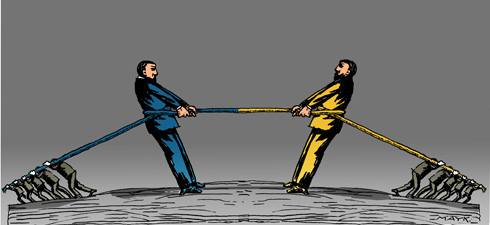Europe East and Europe West can’t seem to really bridge the gulf between them, much less unite. There is a spreading dread that the future might resemble the past, a not-so-remote past, the worst in recent memory, which we shudder to recall. As the first decade of the third millennium draws to a close, Europe, America and much of the rest of the world are surprised by obvious events that hardly anyone could have foreseen in what we call the East: a major cyclical crisis, one of the worst in the past hundred years, has become a widespread commonplace of present-day society and the economy in both East and West, laying siege to politics and culture and breeding situations we couldn’t possible have imagined, a concatenation of events we can’t stop or even control.
The dirt poor prop up wealthy
Just ten years ago, who would have thought that financial capitalism would imperil the existence of capitalism itself, that its internal and external contradictions would be bared to the critical gaze it faces now? The same goes for a neoliberalism compelled to give up various forms of liberalisation which it swore by until only yesterday, and which had become its hallmark; and for a bank system constrained to rein in its own banks; and for a large part of Europe suffering from Euroscepticism.
A form of unbridled capitalism is now invading countries that only yesterday were considered anti-capitalist. The crisis is forcing the dirt poor to prop up those who possess the wealth, whether they happen to be right-wing or left, in hopes of holding on to their endangered jobs – or getting a job at all. In the hope, that is, of maintaining a normal or at least tolerable standard of living, or at least a semblance thereof.
Our intellectuals are scattered
Brecht once wrote that founding a bank is a worse crime than robbing one. But nowadays many of the poor are afraid of what would happen if a bank were to fail, causing the ruination of its proprietary shareholders and the loss of its investments. "A job, my job!" has become a veritable mantra. As a result, we are facing a reversal of the values many espoused and made sacrifices for in the past. For some time now politics has lost some of its most pertinent cultural references – and actually avoids encouraging the growth of any semblance of a positive political culture.
Our intellectuals are scattered and operating in disarray, almost invariably sealed off in their narrow circles, their disparate scenes, confining themselves to their exclusive preserves. They have become isolated individuals evidently incapable of pooling their forces and working together. The power-wielders ignore them, for the most part, or force them to turn in on themselves.
Technologies can supplant the old culture
But for a handful of noted exceptions, the voice of the intellectual can hardly gain a hearing when it comes time to take decisions – and is hardly heeded when heard. The “dissent” of yesteryear, which dared to take such tremendous risks under Stalinist and post-Stalinist regimes, is now defunct, and the critical intellectual condemned to solitude.
Technologies and their various applications, digital and otherwise, seem to retain an ability to supplant the old culture and its obsolete methods, to form a culture in and of themselves and not one of its derivatives. Causes and consequences thus end up inverted and mutually indistinguishable.
West is weary of itself
Against this backdrop, we need to control the pace of these events as well. We have already seen how globalisation stole upon us, snaking its way slowly through a succession of obstacles and a tangle of mistrust. The crisis, in contrast, spread swiftly and unswervingly to encompass the whole planet in no time. I wonder if and how we could control that pace of events and shunt it in a direction beneficial to the vast majority of the human race. Or what will happen when we finally put the crisis behind us for good. What will be our new point of departure? And in what direction will we go? What will be our first step? How will we regain the confidence we need to move forwards?
In the age we live in and with the problems assailing us, the questions far outnumber the answers we are offered. The answers we hear and read hardly satisfy us, at any rate they are seldom encouraging. After all our civilisation has suffered, we’ve become less naive, more critical or ironic: that is in fact one of the few accomplishments on our meagre track record. And not only in the East. Ex oriente lux? Let’s not kid ourselves: the West is weary of itself, staring at its own fate. But maybe that’s the way it’s supposed to be.
Was this article useful? If so we are delighted!
It is freely available because we believe that the right to free and independent information is essential for democracy. But this right is not guaranteed forever, and independence comes at a cost. We need your support in order to continue publishing independent, multilingual news for all Europeans.
Discover our subscription offers and their exclusive benefits and become a member of our community now!












